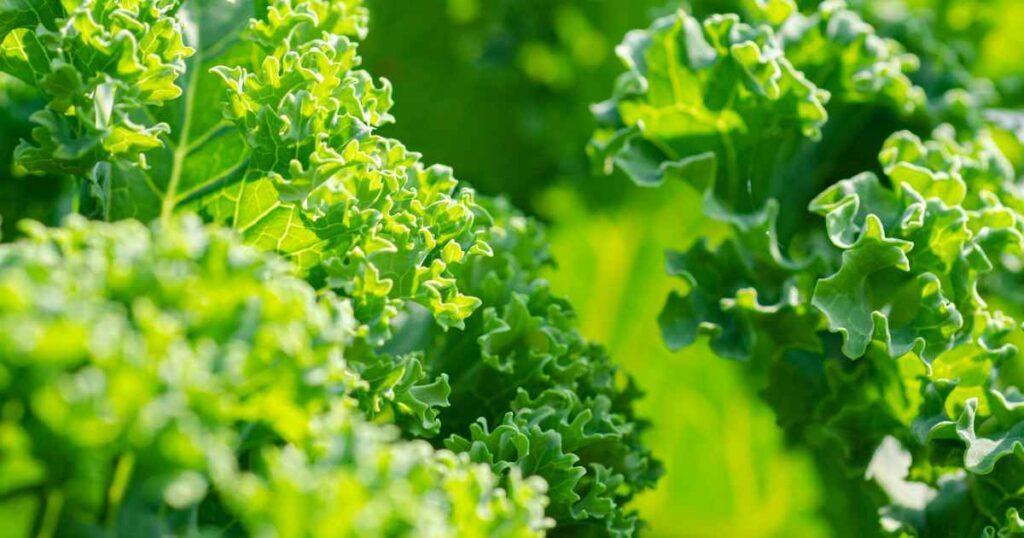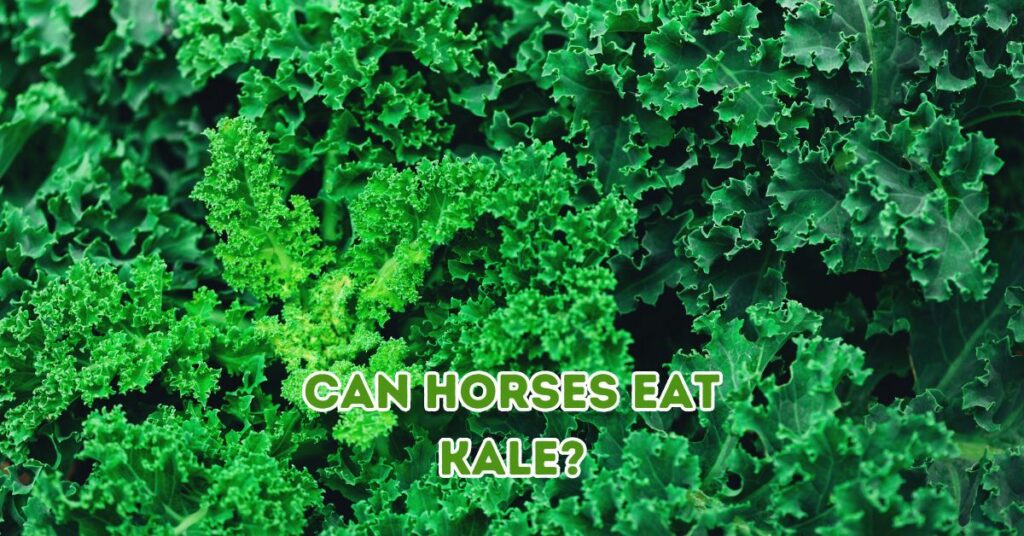As an Amazon Associate we earn from qualifying purchases.
Kale has become a popular part of many human diets, but can horses eat kale too? If you’ve been wondering whether or not horses can eat kale, you’ve come to the right place. In this article, we’ll explore the benefits and risks of feeding kale to horses, as well as the best ways to provide it. From understanding the nutritional value to properly preparing the kale, we’ll provide you with all the information you need to make an educated decision about feeding kale to your horse.
So Can Horses Eat Kale? Yes Or No?
Yes horses can eat kale, but it should be given sparingly. Kale is a nutrient-dense green, and it has high levels of calcium, phosphorus, and magnesium. However, it is also high in oxalates, which can bind to these minerals, making them less bioavailable for horses. This can lead to mineral imbalances and an increased risk of colic.
It is best to consult a veterinarian or equine nutritionist before adding kale to a horse’s diet.
Do Horses Like Kale?
Most horses find kale unpalatable, as it has a slightly bitter flavor and a tough texture. Kale also contains high levels of oxalates, which can bind to minerals, making them less bioavailable for horses. As a result, horses may turn away from the food and not consume it completely.
SEE ALSO : Can Horses Eat Pears?
How To Feed Kale To Your Horse

When feeding kale to your horse, it is important to follow certain guidelines in order to ensure that your horse is getting the most out of the nutrient-rich vegetable. Kale should be finely chopped or wilted before being offered to your horse, as this will make it easier for them to digest and absorb the nutrients. Wilting the kale will also reduce the risk of choking.
Additionally, it is important to limit the amount of kale you feed your horse each day, as it is a high-fiber vegetable and should not make up more than 10-15% of the horse’s total daily diet.
Finally, be sure to monitor your horse’s reaction to kale, as some horses may be intolerant to the vegetable and may experience digestive upset if too much is consumed.
Health Benefits Of Eating Kale For Horses
Kale is a nutritious, healthy food that has many benefits to offer horses. Not only is it high in vitamins and minerals, but it can also have positive effects on the horse’s digestive system, immune system, and overall health. In this section, we will discuss three health benefits of eating kale for horses.
For information on the health benefits of Kale to humans follow this link.
High In Vitamins & Minerals
Kale is an incredibly nutrient-dense green vegetable, offering horses a wide range of health benefits. It is packed with vitamins C, A, and K, as well as essential minerals such as calcium, phosphorus, and magnesium. Kale can help to support a healthy immune system, vision, and bones, as well as promote digestion and normal muscle and nerve function.
Good Source Of Fiber
Kale is an excellent source of fiber and antioxidants for horses, which can greatly contribute to their overall health and wellbeing. Fiber helps to support healthy digestion by providing bulk and aiding in the passage of food through the digestive tract. The antioxidants present in kale can help to protect against cell damage and reduce inflammation while also boosting the immune system.
Not only can this help to keep horses healthy, but it can also improve their performance in competitions and other activities. Eating kale regularly can be a great way to ensure that your horse is getting the nutrients it needs to stay fit and healthy.
Supports Joint & Bone Health
Kale is a nutrient-rich vegetable that can be beneficial for horses’ joint and bone health, coat health, and hoof growth. Kale contains essential vitamins and minerals, such as vitamin K, calcium, and magnesium, which are important for joint and bone health, as well as maintaining strong hooves. The vegetable also contains omega-3 fatty acids, which can help to keep a horse’s coat healthy and shiny.
Safety Considerations Of Feeding Kale To Your Horse
Kale is a highly nutritious food and can be a beneficial addition to a horse’s diet. However, like with all feed sources, there are several safety considerations that need to be taken into account when feeding kale to horses.
Feed As Part Of Balanced Diet
First, it is important to note that kale should not be the main source of your horse’s nutrition. It is best to feed kale in small amounts, as part of a balanced diet. Too much kale can lead to digestive issues, such as colic.
Do Not Feed To Horses With History Of Kidney/Bladder Stones
It is also important to note that kale can be high in oxalic acid, which can lead to the formation of calcium oxalate stones in the urinary tract. As such, kale should not be fed to horses with a history of kidney or bladder stones.
Clean Kale Before Feeding To Horse
When feeding kale, it is important to be mindful of the water content of the kale. Kale that has been sitting in water can become moldy, which can lead to digestive issues. Make sure to clean the kale thoroughly before feeding it to your horse.
Do Not Feed To Pregnant Horses
Finally, it is important to note that kale should not be fed to pregnant or nursing mares. The high levels of calcium can cause the mare’s calcium-magnesium ratio to become unbalanced, which can have a negative effect on the mare and her foal.
When fed in moderation, kale can be a nutritious and beneficial addition to a horse’s diet. However, it is important to take the necessary safety precautions to ensure that your horse is getting the nutrients it needs without any adverse effects.
Can Horses Eat Kale – Final Thoughts
In conclusion and in answer to the question, can horses eat kale? Yes they can, kale can be a nutritious and beneficial addition to a horse’s diet when fed in moderation. However, there are several safety considerations that need to be taken into account, such as the oxalic acid content, water content, and the potential effect on pregnant or nursing mares. With the right precautions, kale can be a beneficial and nutritious food for your horse.
Clydesdale vs Regular Horse – Which Is Best For Me?
Amazon and the Amazon logo are trademarks of Amazon.com, Inc, or its affiliates.

Hey there, I’m Jasmine! I’m a total horse fanatic and have been working with these amazing animals for as long as I can remember. I’m passionate about sharing my love for horses with others and helping them learn more about these majestic creatures. As a professional horse trainer and riding instructor, I’ve developed a deep understanding of equine science and am committed to the welfare of horses. That’s why I founded OwnTheHorse.com, a blog where I share my knowledge and insights with fellow horse enthusiasts. I love connecting with my readers and building a friendly community of horse lovers. Whether you’re a seasoned equestrian or just starting out, I’m here to help and inspire you. Above all, I’m a friendly and compassionate person who truly cares about the well-being of horses and their human companions.

